“The best evidence we have of what World War II was like comes from about 300 million movies made during this era, many of them featuring Ronald Reagan. From these we learn that the war was fought by small groups of men called “units,” with each unit consisting of: One Italian person, one Jewish person, one Southern person, one Tough but Caring Sergeant (played by William Bendix), and of course one African-American. These men often fought together through an entire double feature, during which they would learn, despite their differing backgrounds, how to trickle syrup from the corners of their mouths to indicate that they had been wounded. In the actual war of course, real blood was used.” – Dave Barry, Dave Barry Slept Here

We forget so much. It’s why we hold on to numbers, which are some of the first things we memorize, and the bigger and more ceremonial the better. This year was the 75th anniversary of D-Day, a major milestone and even stronger reminder to never forget. Exactly what we’re not supposed to forget might fade, details passing from memory, and things without that name recognition or a magic number become even more indistinct.
And we forget other things that might remind us. Or they merge into a collective memory, broad but vague, what Barry describes above — dogfaces with strong wills and stout hearts giving the krauts what for. But for what?
After 1945, the 300 million movies about the war (Barry exaggerates but not by much) tapered off significantly, at least in America. The struggles of soldiers returning home and the grey if not black markets and morality of post-war Europe were ripe topics, and espionage flicks about the just-concluded war found an audience. But with no boots on the ground, Hollywood took a break from depicting combat in an exhausting conflict that killed more than 400,000 Americans. Battleground, originally an RKO movie, moved to MGM despite Louis B. Mayer’s belief that moviegoers were tired of war films (per Wikipedia). It was one of the first postwar movies, if not the first, to take on the war itself. Not documentation as the war happened or recreation decades down the line from people using secondhand sources, but a film of living memory.
And it was about a memorable occasion also celebrating its 75th anniversary this year, the Battle of the Bulge, where stretched-thin U.S. and British troops held the line against a surprise German assault on the French/Belgian/Luxembourgish border despite terrible weather and lack of supplies. It had the credentials to be an honest work of memory — though screenwriter Robert Pirosh was not a member of the 101st Airborne, whose men the film follows, he did serve during the Battle. Director William Wellman did not serve in World War II, but he was a fighter pilot with several confirmed kills in World War I.
The story they tell is in some ways fits into Barry’s cliche. It follows a unit of men (here, a platoon) who are generally defined by a main characteristic and an ethnicity, we have a Jarvess and a Wolowicz, a Holley and a Stazak, a Layton and a Rodrigues and an Abner Spudler as the Southern person. They fight and die and eventually win. Even the title is generic; this battle actually had a memorable name but a Battleground could be anywhere. It is for its characters, who in a running joke are never quite sure which country they’re in and what the plan is. “What’s a bulge?” one asks when reading an old newspaper mailed from his sweetie.
What Pirosh and Wellman do is show the details that make this battleground specific. Most of the men are introduced when Marshall Thompson’s Layton, the New Guy (a type Barry inexplicably ignores) comes to their quarters and tries to find a cot, being pushed farther and farther through the tent as the veteran soldiers claim their spaces. It’s a clever way to establish the group’s dynamic and highlight small things to define the men, like one corporal’s obnoxious clicking of his false teeth for emphasis. It’s later on we find out he got those choppers after he bashed his own teeth out in an attempt to be wounded so badly he’d have to leave the front.
Little things accumulate. Holley, played by Van Johnson as the closest person the movie has to a lead, has another runner for the first quarter of the movie — he swipes a few eggs from a lovely Frenchwoman in Bastogne who is taking care of two orphans but is continually stymied when he tries to fry them up in his helmet. He’s sort of a cad and a champion grouser, able to complain and moan about the various hardships of this man’s Army while never crossing the line into obnoxious self-pity or goldbricking. As much as he moans, he does his work and constantly steps up. And he’s actually funny, telling a fellow soldier that his dreams of hardshell crabs and beer are against regulations: the only acceptable fantasy is a wholesome slice of Mom’s blueberry pie.

Actions and tensions add up. Men learn passwords so they can tell friend from foe as spies move through the trees, although pop culture is a stronger shibboleth — one scene has two suspicious groups ultimately trade baseball lingo, new slang and the various boyfriends of Betty Grable before each determines the other is on the level. In a mostly wordless sequence, new guy Layton struggles through digging his first foxhole, completing it only for orders to come in moving about a half-mile along. You can’t bring a hole with you, though. Over and over the men dig and dig and when the snow comes, they shiver and soak. Paul C. Vogel won an Oscar for his cinematography of the snowy fields and forests (filmed in Oregon and Washington as well as Hollywood soundstages) and even on my VHS it’s crisp and chilling. The landscape is not ugly or beautiful; that is not the point. Vogel films it with clarity and without comment, with black branches and white snow and above all grey, grey fog and grey clouds preventing supply drops and grey men fighting and dying underneath.
Because the death toll is also ramping up. As Vogel shoots for immediacy over a pretty image, Wellman films the movie’s two main combat sequences with a lack of affect that makes them land harder. A small patrol of Holley, Jarvess, and Rodrigues runs into a unit of German spies (who not only know the password but are fluent in baseball lingo) and they shoot it out, with the Americans taking out a good chunk of the Germans with a grenade. Rodrigues and Jarvess each kill a man in hand-to-hand combat that Wellman shoots with the right amount of distance to avoid the wrath of censors — the dead men’s faces are not visible, nor is any blood — but with the action clear and merciless. One German is strangled, his legs spasming for a moment, the other bayonetted in the chest, the frenzied stabbing motion shown again and again. There is no music throughout, just footage of men trying to kill each other and watching it you can feel the desperation, more oppressive than any gore.

The Americans survive, Rodrigues (a young Ricardo Montalbán) is wounded but manages to crawl under a wrecked Jeep and hide from an incoming German patrol. Holley and Jarvess promise to return, and they do, several hours later, with Layton and “Pops” Stazak, the old guy of the squad who’s taken a shine to Rodrigues. Who is dead, frozen to death. Stazak moves away from the other men as they cover Rodrigues with a blanket, standing, head bowed, in the forefront of the scene with the other two looking at their friend’s final resting place — it’s an image that recalls gravediggers at a funeral but has a deeper sadness at the nature of the death and the inability to do anything else beyond a small moment of silence for a friend. The image feels spontaneous and inevitable, inadequate and the best that can be done. No blood has been shown, but it hurts.
Some time later, the squad’s camp is invaded while they sleep. Wellman does not show the Germans at all as they shoot up the soldiers who are now trapped in their foxholes; what is clear are the Germans’ firing lines and the paths the Americans can try to navigate for cover to fire back. It’s also bloodless but incredibly tense as one soldier, who’s barely said a word through the movie, crawls out behind one of the few sheltering rocks and lays down return fire, and others crawl out to cover him and feed him ammo after he hits a German officer. Once again, the music cuts out and the only sounds are gunfire and panic and Teutonic shouting.
Holley and Layton cut back and around the camp, clearing a path for others to escape. Abner, who has been constantly throwing his boots out of his foxhole so he can air out his feet in another running gag, is shot while futilely grasping for them so he can join the escape. He collapses and slides back down, piteously muttering “Mama…mama…mama,” until he’s silent and fully in his freshly-dug grave; it’s nearly unbearable to watch. The Americans, regrouped, surround the Germans and wait for them to fully come into the camp, the first time they’ve been visible during the assault. Then they open up with machine guns and turn the camp into a killing field. Some men survive to surrender, but not many.

There is patriotism among all this carnage too. At the movie’s end, when — spoiler alert — the Germans are finally pushed back, the Tough but Caring Sergeant (played here by James Whitmore, not William Bendix) leads his boys back for a breather, sounding off a cadence with their backs straight to show off for the new squads coming in. And our boys are on hand to see the befuddled reaction of those arrogant kraut fucks to Gen. Anthony McAuliffe’s famous response to their demand for surrender: “NUTS!” (“Is that a negative or affirmative reply?” the head kraut asks. “Nuts is strictly negative,” an American officer deadpans.) But it is accompanied by fear, even cowardice. During the German assault, Holley was clearly about to run away, but Layton following him made him stay and fight. No words were spoken but Layton is no slouch and realizes what nearly happened. He mentions this to Jarvess, a determined John Hodiak, and Jarvess’ response has the wisdom of not trying to know too much, of survival: “How do you know what Holley was thinking? How do you know if he was thinking at all? Things just happen, then afterwards you try to figure out why you acted the way you did.” It’s a line that works in the moment as advice from experience to innocence, but also out of time, from a writer looking back from five years down the road to who he was and what he did.
This happens more emphatically toward the end of the movie, at Christmastime. The chaplain, rags instead of boots covering his feet like they do for half of his congregation, gives a brief sermon, and in his one scene Leon Ames delivers the decency of the weary, where any pretense has long been worn away and the truth of a person doing a job and how he does it is left. The sermon does work for what it is in the moment, but Pirosh’s voice as screenwriter is even clearer here, and what he has to say is worth repeating in full:
“Now it’s nearly Christmas…and here we are in beautiful Bastogne enjoying the winter sports. And the $64 question is: ‘Was this trip necessary?’ I’ll try to answer that. But my sermons, like everything else in the army…depend on the situation and the terrain. So I assure you, this is going to be a quickie. Was this trip necessary? Let’s look at the facts. Nobody wanted this war but the Nazis. A great many people tried to deal with them, and a lot of them are dead. Millions have died… for no other reason except that the Nazis wanted them dead. So, in the final showdown, there was nothing left to do except fight. There’s a great lesson in this. Those of us who’ve learned it the hard way aren’t going to forget it. We must never again let any force dedicated to a super-race.. or a super-idea, or super-anything…become strong enough to impose itself upon a free world. We must be smart enough and tough enough in the beginning…to put out the fire before it starts spreading. My answer to the $64 question is yes, this trip was necessary. As the years go by, a lot of people are going to forget. But you won’t. And don’t ever let anybody tell you you were a sucker to fight in the war against fascism. And now, Jerry permitting, let us pray.”

It’s simplistic in many ways, “Nobody wanted this war but the Nazis” in particular. But other passages punched me in the gut. “We must be smart enough and tough enough in the beginning…to put the fire out before it starts spreading.” The overt pleading here makes the disregard of the plea in years since shameful, a dereliction of duty far worse than any moments of weakness from these men on the ground. “A lot of people are going to forget,” is a line from a man who has already seen some forgetting and knows it’s inevitable and knows where forgetting and ignorance will lead. This story and these lines are his and Wellman’s stand against that, a way of defining half a decade into a memory with the clarity and starkness of a rifle jammed into the snow.
Pirosh won the movie’s other Oscar for his screenplay, and it was nominated for Best Picture, Best Director, Best Editing, and Best Supporting Actor (for Whitmore’s TbC Sgt.). That’s a pretty strong showing, but the movie doesn’t seem to have lodged in the cultural consciousness. I’d never heard of it until I picked it up in a Blockbuster clearance binge more than a decade ago and never watched it until now, and now it’s stuck in my head. The movie holds its ground, it knows that’s all that can be done, and if we pass by it’s our loss on our way to losses we don’t want to think about. But the memory is there, waiting. And if we want to claim it, it has claims on us.

